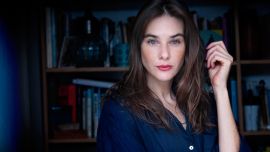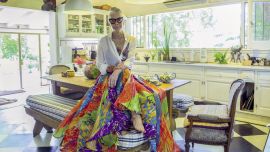Thanks to a recent pair of articles in British publications, we have discovered that some millennials – today everyone is a millennial – are labelling the 1990s sitcom Friends homophobic, transphobic, lesbophobic, awash with sexual harassment, racist and full of body shaming.
It is not a question of generalising, even though that's something that is common in every article that speaks about a generation. Firstly, because the young people who have said these things are only the ones who – sorry for the redundancy – have said it. Secondly, because we have already called “anything” millennial. And finally, because young people are not all the same, just as you or me are not alike. But as I've already heard similar comments in my country, and fearing the risk of starting a revisionist exercise that will turn the happy scenes of our youth into crap, I will go first.
A rich girl leaves her fiancé at the altar. Estranged from her rich and conservative family, she ends up accepting a job as a waitress in a neighbourhood coffee shop.
A young Jewish professor enthusiastically agrees to participate in a sexual threesome with his also young wife and her yoga teacher, only to discover that his wife is a lesbian. Once divorced, he finds out that his now ex-wife is pregnant with his child. She marries her yoga teacher and the three of them form a family in their own unique way.
The son of Italian immigrants, the only male among hundreds of sisters, dreams of becoming an actor. A womaniser to the extreme, the few times he falls in love he is the happiest man on earth. And also the one who suffers the most.
A girl leaves her home as a teenager, after her mother commits suicide and her father ends up in prison. She lives in the street eating from garbage. As an adult she will discover that her real mother was the friend of the woman who raised her as her own and that her real father was her adoptive father.
A young single child of an absolutely dysfunctional family seeks his place in the world with the only defence that losers have: acid humour. His father left his mother to later become a transsexual. His mother becomes a sex guru through writing books.
A Jewish girl obsessed with order and cleanliness, with a long history of being overweight, becomes, unbelievably, a chef. An easy-to-fall-in-and-fall-out-of-love kind of gal, she falls head over heels for a man double her age: her own father's best friend. Her character, at that time, was 27 years old.
The whole group are in their early 20s at the beginning of the series, and around 30 at the end.
Phoebe Buffay, the one who grew up on the street, discovers that she has a brother who – having fallen in love with an older woman – cannot have children. 'Pheebs' lends her belly to her brother, in order for them to have children (namely triplets). Eventually, she also falls in love with a scientist who has to choose between his work and her, and she decides to set him free so that at least one of them can be happy.
Monica Geller, the girl who dated her father's best friend, feels absolutely lonely at her brother's second wedding – the father of the lesbian couple's son, who will eventually make a third trip to the altar – and agrees to have one night of sex with her best friend – the son of the transsexual and the sex teacher – who, despite a very modest sexual background, has an ex-girlfriend that he didn't love but at least guaranteed that he would not feel lonely.
Ross Geller, the Jewish professor, was funny because of his clumsiness and his serial-marriage-committer attitude. The humour with which these stories were presented hid the obsession of this young man to fulfil his desire to form a traditional family. In love since he was a teenager with the rich young woman who leaves everything behind, he confesses his love to her as an adult. They start a relationship, they go out, they fight, he spends the night with another girl. His (ex?) girlfriend wants to get back together but instead discovers the one night stand, and the rest of the series will be marked by the dispute on whether he cheated on her, or whether they were on a break (let's not get into that one, shall we...).
Chandler Bing, the shy young man with acidic humour and no love in his background, works in a place he hates, in a job he cannot explain to anyone. When he wants to quit, his boss offers him a raise and he ends up accepting. He had a key choice: earn a living doing what he likes or to continue flush with cash but unhappy. What he liked was outside the office and work was that: just a job. Madly in love with the former chubby girl – his best friend's sister, no less –he marries her. It was the turning-point of the sitcom, nothing would be the same ever again: there would be no "girls apartment" and "boys apartment." However, the series became increasingly popular because the friends were growing up.
Joey Tribbiani barely manages to fulfil his dream by getting a full-time job in a successful TV soap. His dream of making it to Hollywood never arrives, but he doesn't throw in the towel and keeps on trying, over and over, a sea of crappy casting sessions for awful roles. He does anything to fulfil his dream. Anything. In the relationship between the six, Joey is the glue that keeps them together, the one who keeps all their secrets, the one who is always willing to help – even to the point of proposing to one friend first and then another because he thought they were pregnant and the supposed father had run away. He even gives up on a girl he was dating when he discovers that his best friend was really in love with her.
Rachel Green, the young former rich girl, worked as a waitress while she was pursuing her dream of working in the fashion industry. Finally, she ends up working for Ralph Lauren. In the meantime, learning that in the real world her father is not there to comply with all her whims and that she can't both be independent and live off dad, she faces a series of situations that are presented as hilarious, but in which, if you look closely, you can feel the suffering of the character. The pain of growing up.
Growing up
And that's what Friends is about: growing up. Growing up in a shitty world, growing up in an unknown environment, growing up with what you get and not with what you chose. Growing up accepting or rejecting what you cannot choose. Growing up by doing things that they had never done before. Growing up with every single mistake. Just growing up.
All this took place between 1994 and 2004. Not yesterday, not today. Talking about equal marriage in 1994 was not easy. That a sitcom did it in its first season was either a matter of courage or imprudence. Talking of surrogate bellies is still uncomfortable in 2018. Imagine for a second what it was like 20 years ago.
I understand that it may strike some as surprising that there is no African-American character, nor a homosexual lead, but the series is about a group of friends. And as in any group of friends there can be a gay member, or not, an African-American, or not, a person with a disability, or not. Unless you intend to pass a law that demands that there is a quota for each category in every group of friends, this is the way life is. That's not a bad idea necessarily, but it would be a way to legalise the "I have a Jewish friend" idea (which by the way, there are two of in the sitcom).
Modern Family was the model sitcom that may fit the last decade. A marriage-repeat-offender mature man married to an inmigrante single mother, father – from his first marriage – of a woman who is married and with a "normal" family and a gay son who is also married, to another gay man, of course. In a couple of years time analysts will question if the gay character was too stereotypical, just as they are already complaining that the latina is not stereotypically latina enough. Incoherence, homogeneous image. Political correctness.
I have also read that, in Friends, the fact that Monica would laugh at her chubby past, or that Rachel did so with her old nose – a wink at Jennifer Aniston's own personal history – was somewhat shocking. But choosing to “accept your body as it is” is not the only choice for people. Some choose to lose weight, just as some choose to change their gender. You can't criticise the first and support the latter without exploding with incoherence. In Friends, they don't laugh at the one that's different. They laugh at everything that happens to them. Every single thing.
That the series tells us six shitty life stories and – instead of paying attention to the exercise in personal growth and the development of young people who left everything behind to follow a dream, even without knowing (at least in some cases) what that dream actually was – does not reflect badly on the series itself. It actually speaks volumes of those who criticise it for the little things.
Such criticism says that, to became friends, it seems that you first have to look at the sexual orientation or skin colour of a person and not at who they really are. It says that the critics believe themselves to be so superior that they could all easily accept say a father being a transsexual and that it would not make them uncomfortable to be out in public with them, asking everyone to react similarly even if that did not happen. Such criticism also says that it doesn't matter that a woman has overcome her mother's suicide, a convict father, being abandoned by her biological parents, living on the street, choosing to be single and offering her body to bear someone else's triplets. What matters is whether the jokes she makes are politically correct or not.
But above all, it says that we are living in complicated times, when the important thing is the image that we show to others, the performances we make in our daily life, but not a person's essence. The essence, that internal flame that leads a group of young boys and girls to leave their parents homes to live with what they have, to leave a comfortable family home and move to a dangerous city, with exhibitionist neighbours and a lazy building superintendent, to share apartments and expenses, to work any job and put their heart and soul into what they do even if they don't like it because they have to earn a living, to fall in love over and over again, and see them get their hearts broken every time it doesn't work out. Because that is what life is: a chain of discomforts that we seek to arrange, in order to make them the least uncomfortable possible. And because any failure, as bad as it may be, is better than not having tried at all.
Follow @NicolasLucca on Twitter.


























Comments